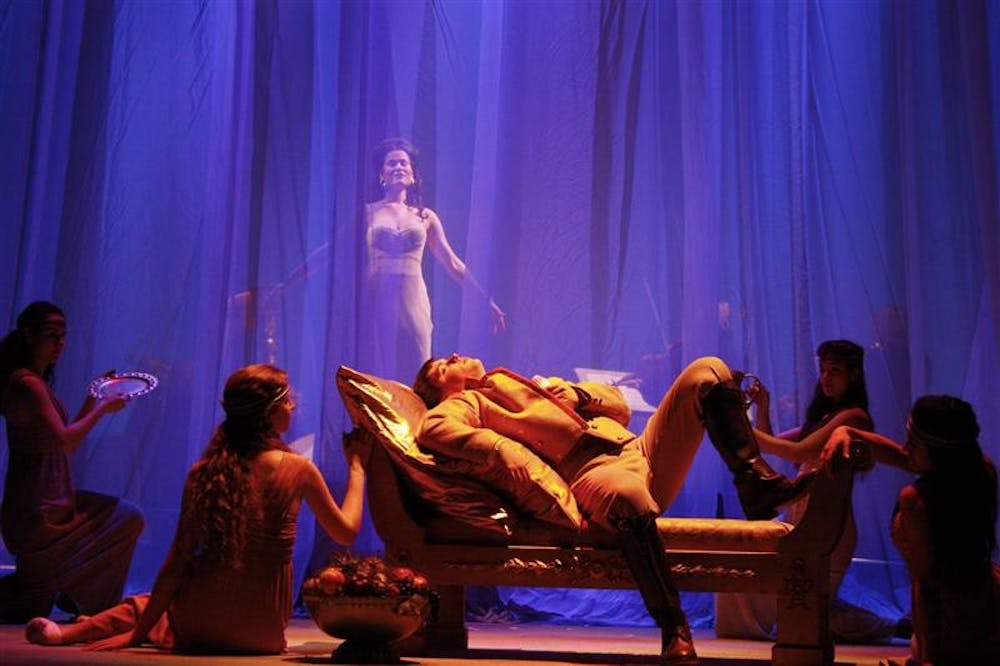IU Opera Theater will present George Frideric Handel’s baroque opera “Giulio Cesare,” written in 1724, this weekend and next at the Musical Arts Center.
The opera unfolds during the period when Roman dictator Giulio Cesare, known by most as Julius Caesar, meets Egyptian queen Cleopatra and helps her in war against her brother and husband King Ptolemy.
The opera will be sung in Italian with English supertitles projected above the stage.
Guest Stage Director Tom Diamond, IU alumnus and Conductor Gary Thor Wedow and graduate student Daniel Bubeck, who plays Giulio Cesare, open up about the politics, music and sex appeal in IU’s fifth opera production this season.
Exploring ‘Cesare’ with show’s lead, director, conductor
Daniel Bubeck (Giulio Cesare)
Indiana Daily Student: What is your favorite part in “Giulio Cesare”?
Daniel Bubeck: I love the third act aria when I’m shipwrecked. I’ve just fought Ptolemy’s army, and I end up washed up on shore. I’m downtrodden, but amazed that I’m still alive. I get to sing my one beautiful slow aria that I’ve been waiting the whole opera to sing.
IDS: What do you like about Handel’s version of this story?
Bubeck: Handel picked a good story, but I think the audience needs to realize that this opera is about the voice. Come to the opera for the music. This was the music that won me over to classical music.
IDS: What is the most challenging part about performing this opera?
Bubeck: It’s a lot of music. Four of the rage arias are very difficult in that they move very fast. You’ve got to be in top form – otherwise, you’ll die by the end.
Tom Diamond (Stage Director)
IDS: What is your favorite part in “Giulio Cesare”?
Tom Diamond: It’s like turning to a parent and asking who is their favorite child. There’s one great song after the next great song. There is a wonderful scene when Caesar and a violinist have a duet, and they make music together. We have this young violinist from France (Romuald Grimbert-Barre) who’s amazing.
IDS: Is this opera only for seasoned opera-goers?
Diamond: Definitely not. It’s a great story and the music is so tuneful. I think it’s for everybody. And it’s sexy, really sexy. Because it’s a love story. And it’s Cleopatra. And it’s Egypt. You know? These hot climates and Romans and Egyptians together – I think is hot stuff!
IDS: How do you think IU ranks as an opera and music program?
Diamond: IU is a famous school and certainly the largest music school on the continent. My expectations were high, and they met them. And this audience is one of students and people who love the opera. So it better be damn good.
Gary Thor Wedow (Conductor)
IDS: What is your favorite part in “Giulio Cesare”?
Wedow: I think baroque opera is a bit like jazz because it has these improvisational elements to it. I love the idea that we’re all going into the pit and on stage and everybody’s going to do something slightly different, because we have given them the freedom to experiment.
IDS: What do you like about Handel’s version of this story?
Wedow: Handel is the great dramatist. It’s all about human emotions, sexual politics, the struggle for power and romance. Handel had this incredible ability to write arias that, besides being beautiful music, also illustrated the psychological dilemma of the actor. I just love that this year’s Bloomington ArtsWeek theme is “Politics and the Arts.” This opera fits in perfectly.
IDS: What do you want the audience to think after they see “Giulio Cesare”?
Wedow: Someone once complimented Handel on what entertaining music he had written. He responded, “I didn’t write it only to entertain you, but to make you a better person.” This production taps so many issues that are important to us. I’m hoping that the audience will be entertained, but also enriched.
IU Opera Theater’s ‘Giulio Cesare’ to tell classic tale of politics, sex, war

Get stories like this in your inbox
Subscribe




